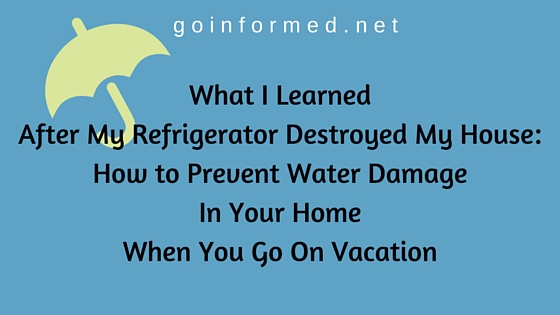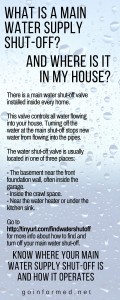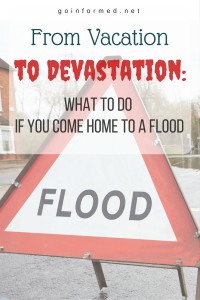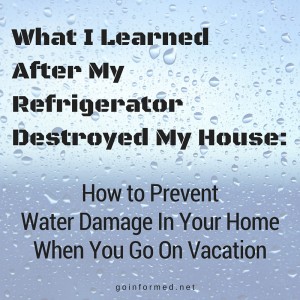What I Learned After My Refrigerator Destroyed My House: How to Prevent Water Damage In Your Home When You Go On Vacation

Something wasn’t right. The house smelled wrong and a strange sound was coming from the kitchen. Luna stepped further inside. Then she saw it. A huge puddle in the middle of the kitchen floor, water shooting from somewhere behind the refrigerator. Quickly she moved down the stairs to reach the main water shut-off, but as she reached the basement she confronted the real catastrophe. Beneath the kitchen the ceiling had collapsed, water pouring through the hole like a waterfall. Desperately cranking closed the water shut-off valve, she rushed upstairs and called 911.
When we arrived home minutes later, a hook-and-ladder truck was parked in front of the house. Firefighters were inside trying to get some of the water out. They assured us that the structure was ok, that we could have the power on, and advised us to call our insurance company and a good disaster mitigation team. In the blink of an eye, what had been a relaxing weekend away had turned into six months of disaster recovery and reconstruction.
Throughout the rebuilding I knew I’d write a post about this, at least one. In the aftermath we found out there were lots of things we could’ve done to prevent the disaster from happening, or at least to minimize the damage. So here it is: What I Learned After My Refrigerator Destroyed My House.
Prevent a leak before it starts. Add these things to your pre-vacation checklist

Shut off the water to your house, and drain the pipes
This may sound drastic, but it will keep your house from flooding. Take away the water and there’s no pressure on weak points in your system. And even if something does break there’s no water to flood through. Removing the water from your pipes also keeps them from freezing, another big cause of flood damage.
Just before you lock the door for your vacation, turn off the water at your home’s main water supply shut-off. Then flush the toilets and turn on a faucet in the lowest part of the house. Let the water run dry before you leave.
If you need water running in the house, for pets or plants, turn off the valves to the toilets, faucets, washing machine, and refrigerator.
Maybe you never noticed, but all of these things have their own little shut-off valves. And while you’ll still have water in the big pipes in your house, these are much less likely to fail than a faucet or refrigerator line. Only leave the water on for the one faucet that will be used for your plants or pets. Click here to find out how to locate and turn off these valves.
Check for leaks
A few weeks before your trip scrutinize areas under sinks and around the water heater to make sure you don’t already have a leak somewhere. According to the American Water Works Association, a leak of 30 drips per minute totals up to nearly five gallons in a day. Imagine if you took five milk jugs right now and poured them out on your hardwood floor, then left that liquid for a week. Then someone came along tomorrow and added five more jugs to the pool. Trust me, this could be your reality. If you find a leak, get it fixed right away.

Have Someone Check On Your House
The monstrous damage our house sustained suggests the leak went unchecked for days. If someone had discovered the deluge sooner we would’ve saved thousands of dollars in damage and blunted the heartbreak of blindly returning home to a disaster.
Whether you turn the water off or not, have a friend or neighbor go into your house every couple of days. Make sure they know where your main water shut off is located. And give them a local emergency contact in case something does go wrong.
Hire a Housesitter
If you want true piece of mind, find someone to stay in your house while you’re away. Not only will this defend against pressure build-up in your pipes, but if something breaks or leaks you will have a helpful person right there to respond. Ask friends and family for a recommendation, or see if someone you know would be willing to housesit.
Invest in a water sensor system
Increasingly, there are technological solutions to help prevent devastating water damage to your home. From water sensors that send an alarm when they get wet, to automatic shut-off systems that stop water flow; many options exist. In the next few months we will be investigating this topic – look for a future post with more in-depth analysis and advice.
More Ways You Can Minimize the Effects of a Flood
Make sure everyone in your family knows where the water shut-off valve is located and how to use it.
See the “What Is A Water Main Shut Off” infographic above. Then go find your water shut-off valve.
Do you know where your home's water shut-off valve is, and how to use it?Click To TweetKeep Your Stuff In Plastic Storage Bins
Even if everything goes wrong and your house fills up with water, you can still protect your possessions with plastic storage bins. We lost a lot of belongings in our flood but my grandmother’s photos survived untouched. Even though they were directly under the breach, effectively at the bottom of a waterfall, inside their plastic storage bin was perfectly dry.
What was not in a plastic bin was my laptop and several other valuable electronics, and only my laptop survived (thanks to a heroic rescue from our local computer shop). If it’s small and can easily be stashed when you leave, put your laptop, tablets, and other sensitive gear in a safe or at least in plastic. This makes it harder for burglars to find too.
Get a safe
A safe is good policy even if you don’t have a flood. It can protect sensitive documents and electronics from water, fire, and theft. If you invest in a safe, get one big enough to hold your laptops and tablets. And don’t forget to stash everything in there before you go on vacation.
Double-check your insurance coverage
If it’s been awhile since you’ve reviewed your homeowner’s coverage limits, be sure you aren’t underinsured. With reconstruction costs often topping those from fire, water can damage everything from your furnace to wood floors to walls to the actual structure of your house. Make sure your policy will cover the full cost if you have a disaster.

Know what to do if you have a flood
Click here for my six essential things to do if you come home to a flood.
For more flood prevention tips and information, visit my Water Damage Prevention board on Pinterest: https://www.pinterest.com/goinformednet/water-damage-prevention/
Do you have other suggestions for preventing a flood? Please share in the comments below.
I usually post about way more fun things.
Read about theme park vacations here.
Or read about the tropical island of Bonaire here.
Or how about a visit to a seahorse ranch in Hawaii?





 Plus lots more at GoInformed.net
Plus lots more at GoInformed.net



Definitely good advice, but this can happen even when you are not away – check out this new product I came across! Cheap and so simple! https://www.refrigeratorwaterlinecontrol.com
That’s pretty cool Patty – thanks for sharing. You’re right – this kind of thing can happen whether you’re away or not. When we rebuilt our kitchen we opted not to hook up a water line to the refrigerator at all, just to be on the safe side. This nifty gadget might go a long way to helping stop a leak in the first place. Thanks for the tip!
Yikes, Sue. What a nightmare. Great to have you share your experience! Thanks for sharing! And it was nice to meet you!
Hindsight is 20-20, as the old axiom goes. I have never experienced any home flooding before, but after reading this, I will be shutting off my pipes before I go on vacation next time!
I hope I have helped keep your house safe & dry Sam! I sure wish I could go back in time and prevent that flood. Glad to help others avoid disaster.